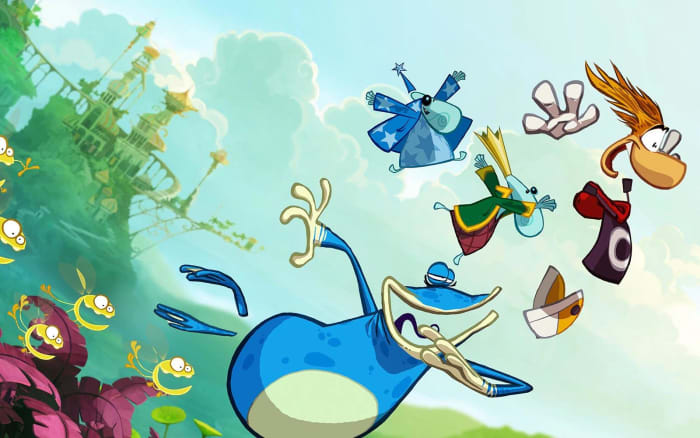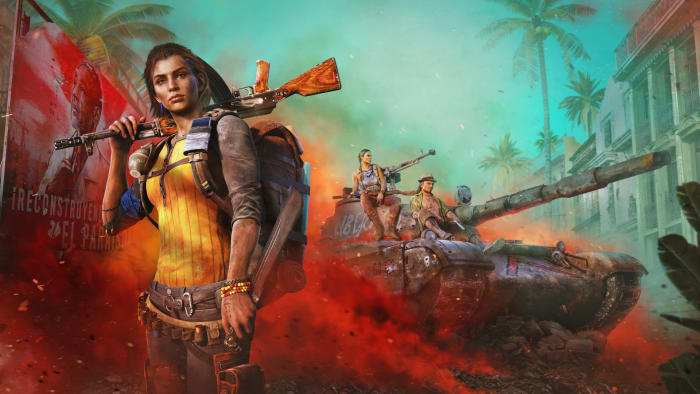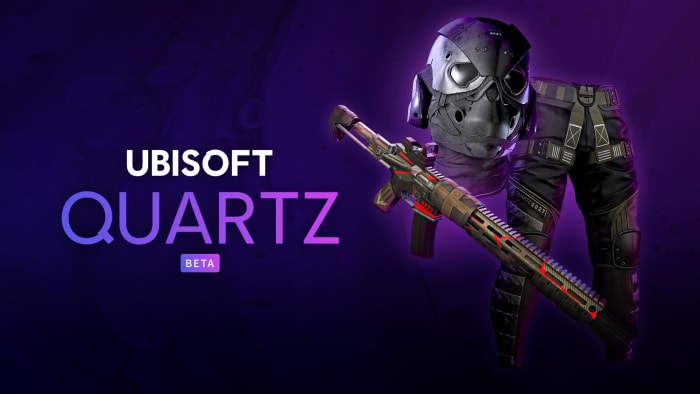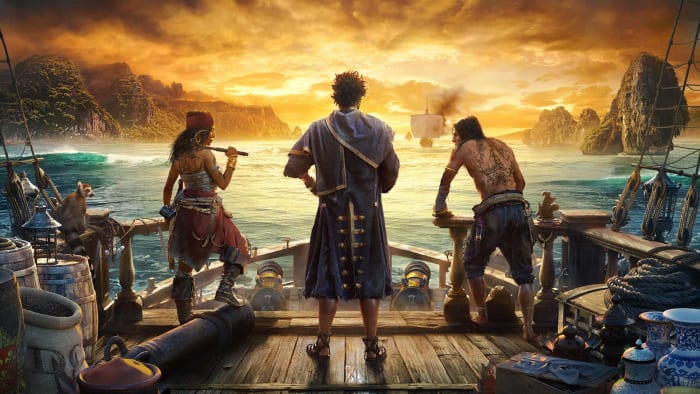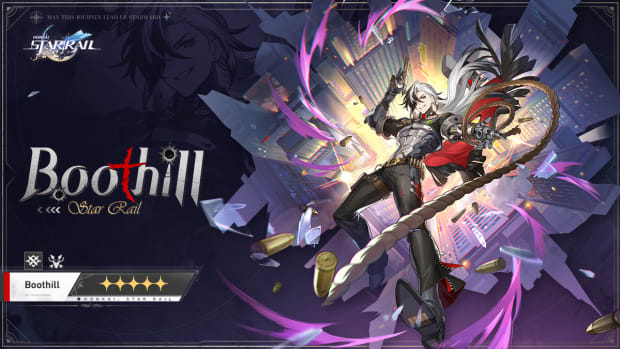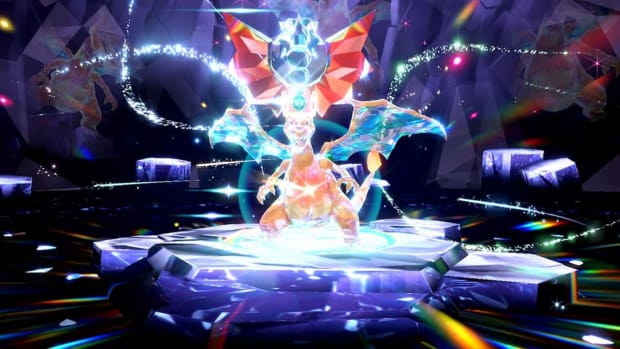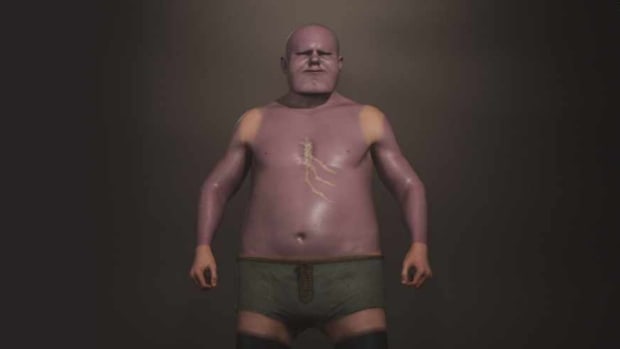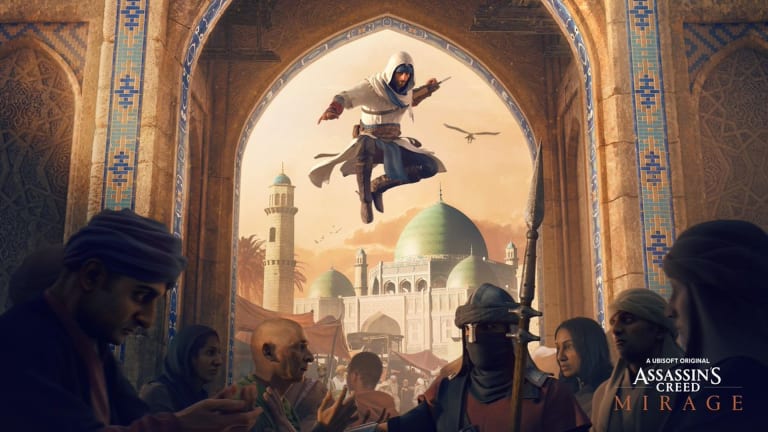
The rise and fall of Ubisoft

Ubisoft has been around since before I was born, springing up on March 28, 1986, under the name Ubi Soft, meaning “ubiquitous software”. The founders, the Guillemot family, were already wealthy by this point, earning their fortune through farming and ownership of a cider distillery at the start of the 20th century. The Guillemot brothers wanted to move away from agriculture and into the industry of the future – video games.
In its first year of business, Ubisoft published a handful of games in France, including Ciné Clap, Fer et Flamme, Masque, and Zombi, which sold a whopping 5,000 copies. By 1987 it was importing foreign games to sell to the French audience. A year later, in 1988 – when I was two years old – Yves Guillemot was appointed CEO. He’s still in power now.
Working from a chateau in Brittanny, it was still a small firm back then, with only a handful of developers, including a teenage Michel Ancel, who would later become best-known for creating Rayman, and a game tester called Serge Hascoët. Rayman was a huge moment for the company when it launched in 1995, marking the start of a period of massive growth. Over the next few years, Ubisoft would establish studios in Paris, Annecy, Shanghai, Montreal, and Milan.
At this time, Ubisoft was looking for a game that would be a hit in the American market. It purchased Red Storm Interactive in 2000, landing the rights to create games with the Tom Clancy name slapped on them. Guns, patriotism, and America – name a more iconic trio.
Red Storm’s Tom Clancy's Ghost Recon and Tom Clancy's Rainbow Six sold well in the US, and these were followed by an all-new Ubisoft game set in the same universe – the result of a partnership with Xbox, in an attempt to create a weapon to rival Metal Gear – called Tom Clancy's Splinter Cell.
It wasn’t just Americans, either. Ubisoft had the hardcore market locked in. All three of the Tom Clancy games were difficult to play and required patience and planning, forcing players to use stealth and strategy to survive, whether you’re breaching and clearing a room or shooting out lights to creep through the dark. There probably wasn’t much crossover between fans of these games and fans of Rayman. Ubisoft’s strategy was to hit various demographics with different tastes.
Hascoët was appointed as chief content officer around this time. His job was to review and greenlight almost every game that Ubisoft worked on, and ultimately decide its direction.
For a while in the middle there, Ubisoft was an innovative company. It created platform games, racers, shooting games, stealth games, and more, and these games often saw big, sweeping changes between sequels.
The debut game might have been made by another developer, but the first three Far Cry titles are varied experiences, and Sam Fisher has worn different goggles across the Splinter Cell series. Ubisoft was also always an early supporter of new hardware and accessories, creating games that take advantage of the Wii U gamepad and VR headsets. It experimented in the multiplayer space, creating game modes that were unlike anything else. It reinvented itself almost constantly.
Then Assassin’s Creed came along and sold 8 million copies. That was the mainstream hit – the dragon the French company has been chasing ever since.
Ubisoft began applying the structure of Assassin’s Creed to its other series. After Assassin’s Creed, most Ubisoft games adopted the open-world template and sported familiar game mechanics – tall buildings you must climb to unlock points of interest became colloquially known as ‘Ubisoft towers’ for a reason. Far Cry has essentially been the same game since the third entry, and Watch Dogs is basically an Assassin’s Creed game set in the modern day. Even Ghost Recon is an open-world game now. Each game is eaten by the next.
Interest in Ubisoft’s games has been steadily in decline, perhaps hinting that players are bored of doing the same thing over and over – like Far Cry 3’s Vaas said, that’s the definition of insanity, after all. Far Cry 6 had strong first-week sales, but it left the conversation as quickly as it entered it. Nothing has mimicked the success of Assassin’s Creed, except more Assassin’s Creed.
Ubisoft might think that its decreasing sales and loss in share value is solely down to an economic downturn – and some of it might be – but it probably doesn’t help that it is constantly in competition with itself or chasing the latest trend.
In 2020, Ubisoft launched a battle royale game called Hyper Scape, hoping to jump on the Fortnite gravy train. The problem was, the train had already passed the station by this point, and other people had parachuted in and supped up all the gravy. The battle royale boom happened in the first place because it offered a different experience to the dozens of FPS games on the market, but the novelty wore off once it was apparent that everyone wanted to cash in. Fortnite, PUBG, Apex Legends, and Warzone have kept their massive audiences, but it’s not an easy sell when there are already four very different, and good, battle royale games out there.
Among its currently announced games, Skull & Bones – a pirate game that takes advantage of the technology used in past Assassin’s Creed titles – is unlikely to turn the company’s fortunes around (and it has just been delayed, again). Beyond Good & Evil 2 is still in development, according to Ubisoft, but we haven’t seen anything from it since before the pandemic. The Splinter Cell remake is something fans have been asking for since the dawn of time, but it’s unlikely to set sales records alight. The Prince of Persia remake is in development hell. Its Avatar game, based on the James Cameron sequel, has missed its chance to land alongside the movie. Three unannounced Ubisoft games have just been canceled. That leaves the next Assassin’s Creed as the only surefire hit. Ubisoft's Star Wars game also has a chance.
Ubisoft attempted to right the ship by jumping on the NFT grift, introducing a new range of “unique” NFT cosmetics into Ghost Recon Breakpoint with its initiative, Ubisoft Quartz. These blockchain items allowed you to get a helmet that looked exactly the same as the other NFT helmets, except with a slightly different serial number. Reports suggest the NFTs made less than $2,000, in total.
It has been disaster after disaster, and Ubisoft shares reflect this, losing almost 20 percent of their value in the past few days.
On top of all of this, the company’s optics are in the bin. The “litigations” section of Ubisoft’s Wikipedia page takes so long to read that you could probably finish Assassin’s Creed Valhalla and all its DLC by the time you got to the end. People at Ubisoft have been accused of abuse and sexual misconduct, and reports claim it fosters a toxic work culture.
Assassin's Creed creative director Ashraf Ismail was fired for allegedly cheating on his wife with a fan, abusing his position at the company. Hascoet, who was accused of physical and verbal abuse, resigned, along with Tommy Francois and Maxime Beland, who were both accused of similar. Not fired, resigned. These were all high-level players in the company, who reported directly to Guillemot, the CEO. None of this was acted upon until it became public knowledge thanks to a series of media reports. The problem is at Ubisoft’s core.
Now Ubisoft Paris is facing a workers strike after Guillemot placed the blame for the company’s poor financial performance on the staff. “The ball is in your court to deliver [Ubisoft’s] line-up on time and at the expected level of quality,” he said, following the announcement that the company, after forecasting a $433 million profit, had an operating loss of $538 million for the fiscal year.
“The ball is in our court, but the money stays in his pockets,” workers union Solidaires Informatique said. “Mr. Guillemot is trying to shift the blame (once again) onto the employees.”
At this point, it’s difficult to imagine what Ubisoft can do to turn its fortunes around. It can improve its work culture, but the stain of those reports will be there forever. It can attempt to innovate in the video game space, but the results of that work won’t be seen for another seven or eight years, due to the realities involved with making video games at this scale.
It seems almost inevitable that Ubisoft will get swallowed up in another acquisition. Journalist Jeff Grubb claims that it has already been looking for a buyer, but it “mostly got laughed at” for being too unwieldy. Like its games, Ubisoft has become bloated. It’s not hard to imagine it being chopped up and sold for parts.
Still, I hope that’s not the case. I hope Ubisoft fixes its problems, and for the right reasons – not just for its optics, but for its workers. I hope it appoints a new CEO who’s hooked into the workforce and gives reassurances instead of demands. I hope it realizes that appointing one guy to greenlight games was a terrible idea. None of us want a future where a couple of companies are in complete control of what we experience, but nobody wants Ubisoft as it is right now, either.
